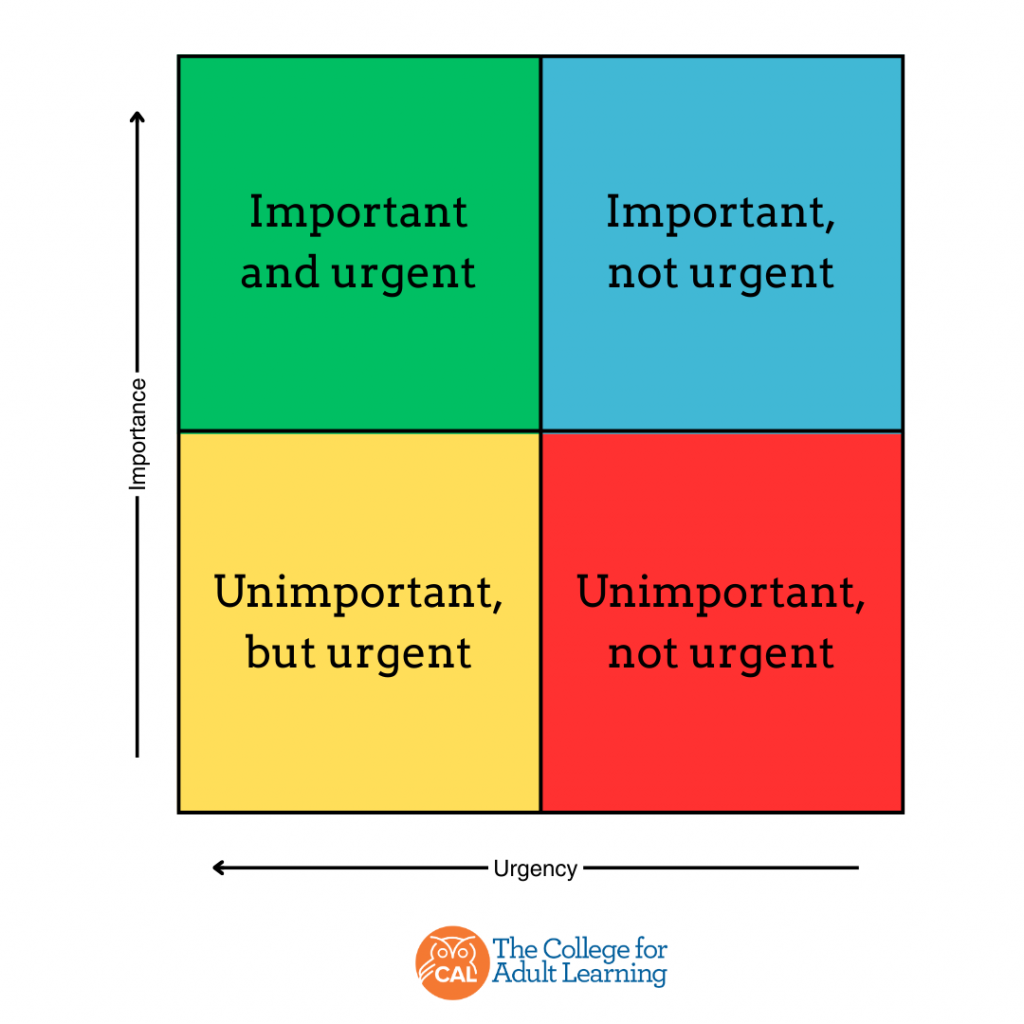
We all have the same amount of time. However, the difference between success and failure most often lies in how we manage time. Time management hacks are techniques that successful people use to hone their lives in a way that supports them to make the most out of their 24 hours.
Let’s explore eight time management hacks you can use to organise your life better for study and work.
1. Use an anti-procrastination list
This is a practical tool to combat the hundred random thoughts that can distract you from important tasks. The anti-procrastination list is ideal for setting boundaries between your work and play time.
Here’s how it works:
- When working, keep a notepad next to you with the heading ‘anti-procrastination list’ to remind you of its purpose
- Any time you’re tempted to procrastinate, write the idea on the list instead
- Once you’ve completed your work, you have a list of activities you can do in your free time
2. Use a timer or the pomodoro technique
Maximise your effectiveness while working or studying by placing an egg timer or hourglass on the desk in front of you. The timer acts as a ‘higher power’ that watches over you while you focus on getting work done. You can apply this hack to short, focused bursts or longer periods of productive time. You may even use the timer on your breaks to ensure you’re not getting distracted or eating into work time.
A variant of using a timer is the pomodoro technique. Here’s how it works:
- Grab a timer (either a physical one or a pomodoro or phone app)
- Decide which task you will work on – it’s better to pick one and single-task if you can
- Block out distractions – shut the door, switch on an app like Freedom or disconnect from the internet
- Set the timer for 25 minutes
- Work only on that task until the timer ends
- Set the timer for 5 minutes and take a break
- Start again and repeat the process 3–5 times
5 Top Apps to help you Study Smarter
3. Create a weekly study plan
One of the hardest tasks to complete after a long day’s work is deciding what to cook for dinner. By taking a short amount of time each week to meal prep, the decision is made simple. A meal planner is also an astute way to ensure you only buy what you need at the shops. Apps such as MealBoard and Paprika even save your recipes in a recipe manager app.
You can apply these same principles to study by:
- Taking 20 minutes on Sunday or Monday to plan for the week ahead
- Blocking out study periods in your calendar
- Deciding which tasks you’ll focus on and what you want to achieve in the week
- Breaking your goals down and assign bite-sized goals to each study session
- Keeping all your study notes in one place so that you can pick up where you left off
4. Maintain a healthy sleeping schedule
If you wish to remain productive while awake, ensure you aren’t sacrificing your sleep. While the choice to sleep sacrifice is tempting, it is detrimental as sleep debt accumulates. Apps such as Bedtime (part of the Clock app for iPhone) and Sleep Cycle can help you gain the six to nine hours of sleep needed to reach peak potential during the day. Continue using the app on the weekend to maximise your results. Aside from working less efficiently, sleep deprivation can predispose issues such as high blood pressure and a weakened immune system. Sleep is important!
5. Prioritise your to-do list to increase efficiency
Essential for tackling the mountain of work at the start of a week, prioritising allows you to avoid matters that aren’t urgent. There are a few different prioritisation strategies you can try:
- Eisenhower’s decision matrix – classify each task as:
- Important and urgent (do these first)
- Important but not urgent (schedule these in your calendar or do them second)
- Urgent but not important (delegate, automate or eliminate these if you can)
- Not important and not urgent (don’t do it)
- The burner list
- Grab a blank piece of paper
- Make two tall columns
- Put your most important project on the front burner (the left column)
- Leave the rest of the left column empty
- Put your second most important project on the back burner (the top of the right column)
- Halfway down the right column, make a ‘kitchen sink’ for miscellaneous tasks
- The reverse snowball or eat that frog
- Complete your hardest or biggest task first
- Then knock off medium tasks
- Finally, finish up with small tasks

6. Set up a dedicated study area
Crucial when working at home, having a designated study area will assist you in reducing distractions. Ideally, this area should not be used for any other activity as the goal is to condition yourself to associate the space with focused work. Make sure the area is pleasing to be in and has plenty of natural light.
7. Avoid striving for perfection
Perhaps the easiest trap to fall into is trying to complete tasks perfectly. While being a perfectionist is useful at specific times, it will only slow you down if you try to be perfect all the time. Have faith in your ability to produce high-quality work, even if the result isn’t exactly as you imagined it in your head.
8. Make the most of supportive study apps
By downloading two or three useful apps, you can transform technology from being a previous distraction to a newfound ally. You may find our post on the 5 apps to help you study smarter helpful.
Commit to these time management hacks and organise your life – at work or when undertaking online study – and you’ll never look back.
Download our FREE Career Action and Development Plan Template
Inside you will find resources to help you assess your current career position, determine your career direction and effectively plan your career goals.
Creating your Career Plan is the first step towards getting where you want to be in your career.
Download my Career Action Plan





